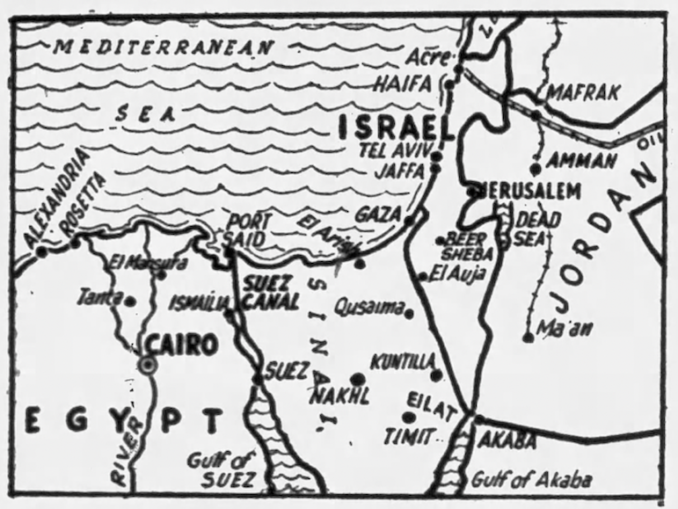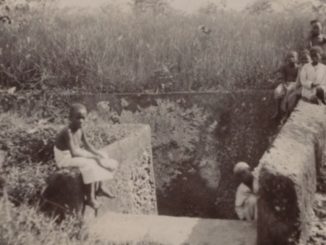
Israel,
Unknown artist – Newspapers.com, reproduced with permission
In 1957 my uncle, John Alldridge visited Israel for the Birmingham Mail. This is the last of his reports. – Jerry F
When an Israeli defines a civilian as a soldier on leave for eleven months in the year he isn’t exaggerating.
In Israel all men do national service. They do two-and-a-half years from the age of 18 and afterwards go on the reserve, with annual training periods and refresher courses, until the age of 45.
Single women serve for two years, get basic training on rifle and light machine-gun, then stay on the reserve until they are 34.
This means that a nation roughly the size of Wales, with a population of not quite 1¾ million, has a young highly-trained defence force of 25,000 always in uniform and under arms. But in an emergency the Chief of Staff, Major-General Moshe Dayan, can call on ten times that number.
Last October an expeditionary force of 250,000 was called up and sent on its way into Sinai within 12 hours, although not one man in a hundred knew what it was all about or where he was going. This was blitzkrieg with a vengeance.
In Israel the army, the tiny navy, and the fledgling air force are under one command. The ranks in all three services are the same.
So a young Israeli recruit isn’t just a soldier, a sailor or an airman. He is a member of the Israel Defence Force.
He believes quite sincerely that any war he may have to fight will be a defensive war. And when you look at the map, and study that cordon of all-but encircling Arab states, never more than 20 miles away from him, you can see his point of view.
Ask him why he invaded Egypt last October and he has the answer pat; the sole aim of the Sinai campaign was to wipe out “fedayeen” bases in Egypt which had been a constant source of trouble for years.
And, anyhow, isn’t attack the best form of defence?
For a purely defensive force this national service army has a remarkably high morale.
At weekends, when the roads are crowded with them, hitch-hiking home, you might think you were back again in war-time England. An England enduring and enjoying its Finest Hour.
These tough, sunburnt young men and women wear a uniform very much like our own, and wear it as if they were proud of it.
The bulk of these youngsters are native-born “abras.” A hard, proud, self-opinionated generation, born without any of the complexes and inhibitions – and none of the wry, salty humour – of the Jew outside.
To these super-confident youngsters this is, indeed, the Promised Land and they the Chosen People.
Show them documentary films about Nazi concentration camps and they refuse to believe it.
Why? “It can’t possibly be true. These people were treated like dogs and worse. They were beaten up. And yet they didn’t fight back!”
The young Israeli has forgotten how to laugh. But he has learned to hit back. And at the moment he is well ahead on points.
Mixed in with them, a tactful leavening are new immigrants, pouring in from the old countries of the world. Half a million of them since 1950.
The immigrant who, perhaps, has done his national service in Britain will find a startling difference.
For one thing, he finds that at least a quarter of his time during basic training is spent on formal education — with Hebrew and modern Jewish history the two keystones.
Then, as soon as he is weapon-trained, he will be off for a long spell of frontier duty. In Israel this means working beside civilian farmers and engineers on new towns, new settlements, new projects of all kinds.
And in Israel there are frontiers everywhere.
In almost every other country in the world the soldier —except, perhaps, in time of war — is essentially unproductive. In Israel he is just one more working unit in the nation’s all-out production drive.
You will find him driving a train over a track that was laid only yesterday. Or guarding a bank that was only built last week. Or working on the roof of an adhesive tape factory that was only an acre of baked earth six months ago.
There is a vital urgency about all this that takes your breath away. It is like watching a family of beavers working feverishly to build a dam before the flood breaks over it.
Nobody in Israel seems to be building for himself. He is planning for a future he may never live to see.
To safeguard that future he is prepared to drive himself to the limit. He will live like a monk in a concrete cell in the middle of a stony wilderness because one day a town will grow up around him. Or over him.
His instincts for improvisation, sharpened by necessity, have reached fantastic limits. Moses drawing water out of a rock was in the apprentice class compared with these latter-day Children of Israel who bring water a hundred miles out of swamps and over mountains to make the desert bloom.
If I have brought back one memory of Israel it is of hundreds of water-sprinklers, each sending up its fine sprays of rainbow-tinted water.
There is magic in this. For where each drop of water falls, something will grow where nothing grew before.
And there is another memory which I should like to forget but cannot. Not water this time, but wire. Red-rusted, cruelly barbed wire. Miles of it, creeping and crawling like some poisonous weed, choking life, strangling hope.
It runs down the middle of a village; parts father from son; makes enemies of brothers; divides a field; breaks up a valley; disrupts a nation.
Because of it I may see from afar, but may not visit, the place where Christ was born.
What hope can there be for Israel or the Middle East while that cursed wire is there?
Reproduced with permission
© 2024 Newspapers.com
Jerry F 2024



